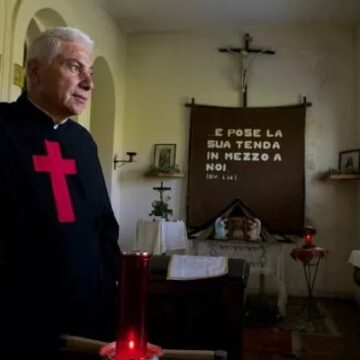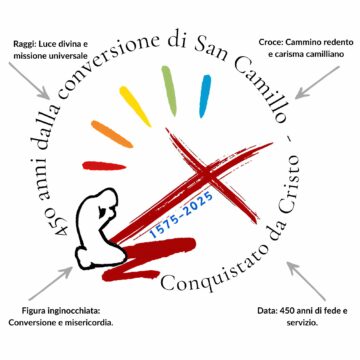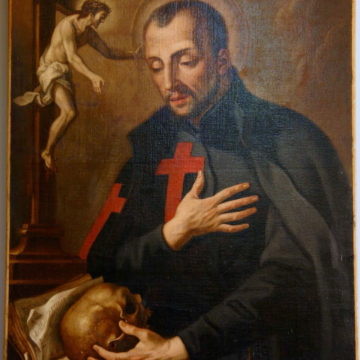Sunday Homily by Rev. Fr. William Eronimoose MI (Camillians)
My Homily for the 26th Sunday in Ordinary Time (Year A) is centred on the theme: Evangelizing the Evangelized so as to walk the talk.
The greatest truth of Christianity is Jesus brought God to us and He purchased us with His blood so as to belong to Him and to form a family, a community, a church in which God is experienced as Mercy, Jesus as Compassion and the Holy Spirit as Communion. The missionary voyage of Jesus is nothing but to establish a community that is both evangelized and evangelizing in Mercy, Compassion and Communion.
And this is the Good News. Every Christian is the one who sincerely accepts this Good News; through the power of this acceptance and of shared faith, he gathers together in Jesus’ name in order to seek together the kingdom, build it up and live it. Thus, every Christian makes up a community which is in its turn evangelizing. Evangelizing is in fact the grace, the vocation and the identity, proper to the evangelized community. She lives in order to evangelize, to preach and teach, and to be the channel of the gift of grace, to reconcile sinners with God (cf. Evangelii Nuntiandi #13, 14).
But what is must today is the evangelization of the evangelized people who have lost their credibility and joy of being saved because they are moving according to the vast and profound changes of present-day society, and thus losing their hold in God. This leads the righteous to lose their righteousness, the faithful to lose their fidelity to the Gospel and the sinner to lose their way back to God.
In this context, today’s readings help us to evangelize the evangelized so as to walk the talk for Jesus walked the talk in prima persona when He pitched His Tent among us.
The First Reading from Ezekiel 18:25-28 is an invitation for us with double task: 1) to evangelize the evangelized (the righteous) so that he/she should not become the sinful person; 2) to evangelize the non-evangelized (the sinner) so that he/she should become the righteous. The heart of the first reading is that both the righteous and the sinner should be evangelized so that each one will remain integral in righteousness.
The Second Reading from Philippians 2:1-11 outlines the truth that Jesus the Sinless Person because of His obedience and humility took up our sinful nature. In so doing, our sinful nature was purified and got transformed into the very Nature of Jesus, and thus making us righteous. Therefore, we whose nature is transformed should have the same attitude of Jesus so that our righteous life will remain always intact and evangelized. The purpose of our life with the Nature of Christ in turn is to evangelize the evangelized so that they get united in the nature of Christ and to remain whole.
The Gospel of today from Matthew 21:28-32 is an invitation to check whether we have lost our nature in Christ through a life of contradiction, compromise and dissatisfaction as it happened in the life of the two sons in the parable: One said no but went; the other said yes but did not go.
The meaning of this parable is crystal clear. The Jewish leaders are the people who said they would obey God and then did not. The tax-gatherers and the harlots are those who said that they would go their own way and then took God’s way.
The key to the correct understanding of this parable is that it is not really praising anyone. It is setting before us a picture of two very imperfect sets of people, of whom one set were none the less better than the other. Neither son in the story was the kind of son to bring full joy to his father. Neither of them walked the talk. Both were unsatisfactory. But the one who in the end obeyed was incalculably better than the other. Still, the ideal son would be the son who accepted the father’s orders with obedience and with respect and who unquestioningly and fully carried them out.
 But the parable tells us the truths about our unsatisfactory life that we are living today. It tells us that there are two very common classes of Christians in this world. First, there are those whose practice is better than their profession: they claim to be tough, but they are kind and generous, almost in secret. They profess to have no interest in the Church and yet they live as good Christians. Second, there are Christians whose profession is much better than their practice. They promise anything: they make great protestations of piety and fidelity: but their practice lags far behind.
But the parable tells us the truths about our unsatisfactory life that we are living today. It tells us that there are two very common classes of Christians in this world. First, there are those whose practice is better than their profession: they claim to be tough, but they are kind and generous, almost in secret. They profess to have no interest in the Church and yet they live as good Christians. Second, there are Christians whose profession is much better than their practice. They promise anything: they make great protestations of piety and fidelity: but their practice lags far behind.
The real point of the parable on the one hand is that while the first class are infinitely to be preferred to the second, neither is satisfactory. The really good man is the man in whom profession and practice meet and match; in whom there is always walk the talk. The real attitude is obedience, willingly and graciously given.
Since the attitude of the two sons in the Gospel are not praiseworthy because one said ‘no’ and went, and the other said ‘yes’ but did not go, both the attitudes are to be avoided. As faithful sons they have to be always ready to obey the father. They should not play with their words.
The Gospel of today invites us to look into our life whether it resembles in any way with the life of the two sons: whether we say one thing but we do another thing; why we say ‘no’ first and then we say ‘yes’; why we say ‘yes’ first and then we say ‘no.’ There is contradiction in the first son as well as in the second son. True evangelized person should never have contradictions. In a life renewed and redeemed by Christ, a Christian is always a non-contradicting, a non-compromising person because Christ has already transformed our sinful life into a sinless one.
Then why do we live in a contradictory life like that of the two sons in the parable? Some more meditation will help us to answer to this question and change our contradictory life.
In this context, I invite you to meditate on the attitude of the two sons, comparing it to the attitude of the Church of Laodicea and the Church of Ephesus in the Book of Revelation (chap. 2 and 3). Pope Francis in his book “Open Mind, Faithful Heart: Reflections on Following Jesus” very clearly highlights the attitude of these two churches and the response of God towards them.
This attitude of the Church of Laodicea is a lukewarm attitude: I know your works; you are neither cold nor hot. I wish that you were either cold or hot. So, because you are lukewarm, neither cold nor hot, I am about to spit you out of my mouth (Rev 3:15-17).
In my view, this first son can be compared to an attitude of lukewarm, neither hot nor cold. He should have been very active, with burning zeal and always responding through ‘yes’ but when his father asked he said ‘no’ because like the church of Laodicea he was vain, self-satisfied and boasts himself proudly: “I am rich, I have prospered, and I need nothing” (Rev 3:17). The first son should be evangelized to move away from his blind ‘no’ and to make him repent because God reproves and disciplines those whom He loves (cf. Rev 3:19). The first son must experience  conversion to say always ‘yes’ because his conversion from no to yes is not a sincere conversion, nor a true repentance. The real conversion is to be always actively obedient to the call.
conversion to say always ‘yes’ because his conversion from no to yes is not a sincere conversion, nor a true repentance. The real conversion is to be always actively obedient to the call.
The attitude of the Church of Ephesus is one of abandoning the love she had at first: I know your deeds, your hard work and your perseverance. I know that you cannot tolerate wicked people, that you have tested those who claim to be apostles but are not, and have found them false. You have persevered and have endured hardships for my name, and have not grown weary. But I have this against you that you have abandoned the love you had at first (Rev 2:2-4).
The Church of Ephesus has much to commend it: it had behaved well; it has been patient in its sufferings; it has resisted evildoers; and it has taught solid doctrine and rejected the deceits of the false apostles. But the Lord is angry because she has abandoned the love she had at first (Rev 2:4).
According to me, the second son can be compared to the Church of Ephesus which is a clear-cut example of abandoning our saved nature, our love for Jesus. Very often, our life moves from righteousness to sinfulness. This happens when we abandon the first love with which we started our evangelized life. We, as the second son, lived our life so well in doing the things for others and perform many wonderful things but we still fail in being faithful to Jesus because we have abandoned our love for Him. We follow our own heart but our heart is far away from God. In losing the first love, we remain blind to the urgency of God’s will to establish His presence among humanity though we carry out wonderful ministries.
Pope Francis in Misericordiae Vultus says, “When the Lord bestows a mission, He always employs a process of purification, a process of perception, a process of obedience, a process of prayer. The important thing is not that you have encountered God, but the whole journey to accomplish the mission that He has entrusted to you.”
Evangelization of the evangelized needs a purification of our contradictory lives, a perception of our transformed nature in Christ, an obedience to the voice of God that resounds in the noisy world of today, and a prayer to God to always walk the talk even if we are tempted to behave like the two sons in the parable.
Henri Nouwen in his book Return of the Prodigal Son says, “God rejoices. Not because the problems of the world have been solved, not because all human pain and suffering have come to an end, nor because many have been converted to Christianity. No. God rejoices because one of His children who were lost has been found.”
In the same way, God rejoices because we the evangelized people have changed our attitude of contradictory lives. God rejoices because the real attitude of ours is obedience, willingly and graciously given, like Jesus whose obedience brought God to the world and joy to the humanity.
May God bless you all in the name of the Father, and of the Son, and of the Holy Spirit. Amen.











